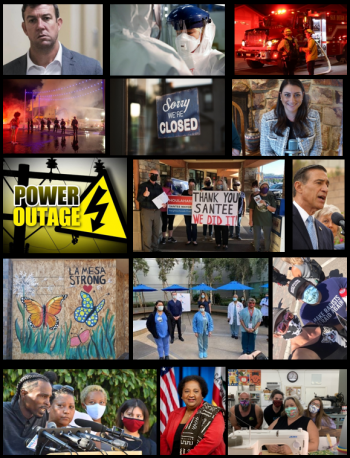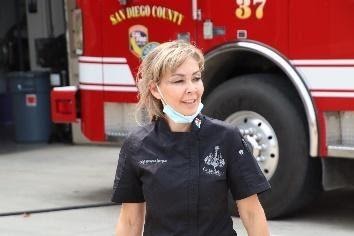 By Miriam Raftery
By Miriam Raftery
December 29, 2020 (San Diego’s East County) – The most tumultuous year in recent memory began with the resignation of a local Congressman and the announcement that across the globe, China cancelled its Lunar New Year celebrations to mark the incoming Year of the Rat and ordered quarantine of 25 million people due to a dangerous new strain of coronavirus.
Who could have imagined that the coming year would lead to a worldwide pandemic, widespread quarantines and economic lockdowns impacting virtually everyone?
In addition, 2020 brought racial unrest, a riot in La Mesa, wildfires, and contentious elections, both locally and nationally. But there’s one point on which we can all agree: we’re glad 2020 is finally over!
Below are the most significant news stories that impacted East County residents each month during this challenging year.
 January
January
After pleading guilty to diverting campaign funds for personal use, Congressman Duncan Hunter (R-Alpine) resigned, leaving constituents without representation for the rest of the year.
The first two cases of COVID-19 in Southern California were diagnosed as the novel coronavirus swiftly spread around the nation and the world.
Strides were made to help the homeless when El Cajon’s city manager challenged other East County cities and the County to do more to serve homeless people. Supervisors agreed to seek sites for shelters in unincorporated areas, though COVID-19 later disrupted this effort. Rev. Shane Harris successfully pushed to document foster youths in the annual homeless count in January.
The Cajon Valley School District filed a lawsuit in Superior Court against Trustee Jill Barto for various alleged wrongdoings. Shortly after, she sued the district in federal court alleging violation of her rights.
Lawsuits sought to overturn AB 5, the new labor law that targeted gig workers. Though intended to force big companies such as Uber to provide benefits to workers by reclassifying them as employees, the new law proved devastating to many gig workers such as actors and musicians. Little did they suspect that an even worse threat to their careers was looming for many, shortly before COVID-19 led to cancellation of virtually all live entertainment venues.
February
 March
March April
April May
May June
June
The National Guard was deployed to protect downtown La Mesa. Protests and confrontations with Defend East County members, a group formed with a mission to protect against looting, heightened racial tensions in Santee. Soon after, thousands marched for justice in Santee, where the city council grappled to better address racial concerns, ultimately passing a resolution denouncing racism.
There were bright spots amid the chaos. A Rebuild La Mesa fund had raised over $160,000 just six days after the riot, ultimately bringing in much more to help businesses damaged or destroyed. A team of artists painted murals on boarded up storefronts, bringing beauty back to the downtown village. A peaceful “Unity Rally” of motorcyclists roared into La Mesa, where a photo of the LMPD Chief Walt Vasquez hugging a black motorcyclist went viral.
La Mesa Police dropped charges against Amaurie Johnson, after body cam footage failed to back a police officer’s account of the controversial stop that inflamed racial tensions days before the riot. ECM interviewed La Mesa’s mayor and police chief on the protest preparations and riot responses. In a virtual meeting, the city council fielded heated comments from the public and voted for an independent investigation
In other June news, a new SANDAG report found black and Hispanic communities hardest hit by the health and economic crisis. An ECM report found that a lack of data blocked assessment of COVID-19 impacts on Middle Eastern communities in our region.
El Cajon made it easier for sidewalk cafes to open, but the city ended its long-time lease with Crisis House. By year’s end, the city’s only walk-in homeless services center had moved to Santee. The Cajon Valley Union School District found a bumpy road to its new school year during the pandemic, after the state and county approved schools to reopen, leaving educators to grapple with new learning realities.
A controversial proposed housing development went down in flames over wildfire evacuation concerns, when County Supervisors rejected the sprawling Lilac Hills Ranch. Kumeyaay Indians staged a protest near Campo against the border wall, briefly halting dynamiting of an area that tribal members say contains sacred remains.
An ECM special report led to a major change in business closure policies after winery owners called the shutdown of bars unfair to rural wineries (an action that could have crushed the local wine industry). After ECM brought this disparity to the attention of county officials, the county eased the rules for wineries.
 July
July
Christian Youth Theater wound up in the news spotlight in July over alleged sexual abuse of students and racial bias. Based in El Cajon, CYT shut down all local programs indefinitely, laid off most staff and ended the Russell family’s leadership of the popular, but troubled, theater program.
A nonprofit group and neighbors of the proposed Campo Wind project filed a lawsuit aiming to halt the energy development.
Amaurie Johnson filed a lawsuit against La Mesa alleging police misconduct.
With funding from a Facebook Journalism Project grant, ECM provided in-depth reporting on the pandemic locally including a two-part series on impacts to the African-American community (part 1, part 2), the struggles of a Syrian refugee family amid the pandemic, the negative impacts on survivors of torture locally, healthcare disparities among Arab-Americans, and steps the county was taking to reduce COVID-19 in Latino communities after ECM’s early reporting on these disparities.
ECM also reported on how COVID-19 shutdowns are impacting local nonprofits as they work to find new funding sources with gatherings, programs and classes largely shut down. We profiled the impacts on Noah Homes, the East County Boys and Girls Clubs, the YMCA, and others. We also covered the crisis facing local theaters due to the COVID-19 shutdowns.
One of our most important reports revealed fatal flaws in the county’s relief plan for local businesses and nonprofits that made most of them ineligible, such as requiring a business license even though the county no longer issues business licenses in unincorporated areas. Our report led to changes in the rules to allow many more businesses and nonprofits to qualify for much-needed relief.
We covered efforts of local cities to help residents such as Cares Act aid in Lemon Grove and an El Cajon grant program for small businesses. We profiled the San Diego Food Bank’s Herculean efforts to expand feeding the hungry amid the pandemic. As mental health and depression issues increased due to the quarantine and mounting economic pressures, we published tips on how to get help accessing mental health services.
To provide hope for the future, ECM investigated local research efforts to find treatments for COVID-19 as well as vaccines and antibodies testing.
How safe are child care centers and schools during the pandemic? An ECM special report provided facts and data as of July.
Churches pushed back against shutdowns of indoor services and a ban on singing, filing a lawsuit against the state.
In a win for environmentalists in July, County Supervisors opted not to appeal a court ruling that found its climate action plan inadequate.
 August
August
SDG&E power outages during triple-digit heat and storms aimed to prevent wildfires, but sparked anger among residents who said their safety was put at risk to protect the utility from liability.
ECM hosted our first virtual “East County Movers, Shakers and Newsmakers” event featuring a top local medical expert on COVID-19 and an SDG&E representative on drive-through wildfire safety fairs.
Nationally, showing a sharp divide over how to handle the COVID-19 crisis, Joe Biden accepted the Democratic presidential nomination, promising to bring America together, at the first virtual convention. President Donald Trump accepted the Republican nomination in a live event without masks or social distancing. ECM co-sponsored a debate among Congressional candidates Darrell Issa and Ammar Campa—Najjar hosted by the League of Women Voters, showing divergent views on COVID-19 relief, police reforms, healthcare, immigration, the economy and more.
El Cajon Mayor Bill Wells drew both praise and condemnation when he urged police to defy state and county public health laws and regulations by not enforcing business shutdown or masking orders. The County charged a Ramona gym owner for defying shutdown orders.
As racial justice protests continued, a man was arrested for battery of protesters in La Mesa, where an ECM photographer was also physically attacked. After the retirement of Chief Vasquez, La Mesa named Captain Matt Nicholas as interim chief and announced a nationwide search for a new police chief.
The homeless crisis drew action from local cities. In August, El Cajon approved emergency sleeping cabins for homeless women and children. La Mesa created a citizens committee on homelessness. La Mesa also approved CARES Act aid for renters, businesses and the homeless.
ECM special reports highlighted the risk of foreclosure and steps to protect properties, as well as how high prices and low inventory put the squeeze on homebuyers despite the pandemic.
Another health crisis continued to rage: county officials warned of a rise in Fentanyl fatalities tied to counterfeit drugs.
At the end of July, the Governor announced most businesses could reopen, with limitations.
In other August news, former Congressman Hunter’s wife, Margaret, was sentenced to probation, avoiding prison after pleading guilty and cooperating with prosecutors. ECM won awards for our coverage of Cajon Valley Union School District finances and the resignation in 2019 of El Cajon Councilman Ben Kalasho.
The San Diego Padres made Major League history with four grand slams in a single game, finally giving us all something to cheer about.
 September
September
The hottest local story of September was the Valley Fire in Alpine. ECM sent an alert on the initial Valley Fire threat, then covered the loss of homes as the fire swelled to thousands of acres, the military joining the aerial battle against the blaze, and a regional disaster fund set up to aid victims plus individual funds to help families rebuild. ECM also covered a press conference at which fire officials and political leaders warned of a dangerous situation region-wide as high winds forecast threatened to push the fire west to San Diego overnight. The fire damaged the electrical system, leaving many without power for days, and destroyed over 30 homes.
The owner of the new Chandelier Lounge restaurant (photo), forced to shut down just weeks after its grand opening, gave away food to firefighters during the Valley Fire, demonstrating a generosity of community spirit.
Reopening of schools was allowed starting September 1, the County announced, provided safety pans were approved.
Since the pandemic made it impossible for the public to meet candidates in person, ECM hosted candidate forums in September for the County Supervisor District 2 race as well as Santee mayor and city council, Lemon Grove mayor and city council, and El Cajon City Council District 2 and District 4. ECM also held a forum for La Mesa candidates and later added video interviews with candidates who could not attend the forum.
The Governor signed a bill to exempt many independent workers from AB 5, much to the relief of gig workers hit with the double-whammy of AB 5 and the pandemic.
A proposal to convert the Holiday Inn in La Mesa into homeless housing drew opposition from the city and public, after revelations that the County approved it without disclosure to most city leaders or residents. Councilman Colin Parent drew criticism for backroom dealings with the developer and Supervisors withdrew their support for grant funding, due to the lack of transparency.
Crest Elementary school adapted with a new outdoor education program, a stand-out in the COVID-era.
Santee’s City Council approved Fanita Ranch in late September – just weeks before voters could weigh-in on a ballot initiative to give the public a say on large housing projects that exceed general plan requirements. Two Councilmembers, Rob McNelis and Laura Koval, broke a 2018 campaign promise to let voters decide on the controversial development.
The Padres advanced to postseason play, leading to drive-in fan fests in a year with little else to celebrate.
October
November
San Diego slipped into the state’s “Purple Tier,” prompting stringent new restrictions and shutdowns in November due to rapidly spreading COVID-19 as hospital ICUs approached capacity across Southern California. The Governor ordered a statewide curfew and San Diego’s Sheriff began cracking down on violators. But some churches and restaurants defied shutdowns, while others complied.
ECM provided live coverage, via ZOOM, on Election night. Key outcomes include two new members of Congress for East County, Sara Jacobs and Darrell Issa as well as a new Supervisor, Joel Anderson, who won by less than 300 votes in a tight race. Democrats took control overall in San Diego County, including a majority on the County Board of Supervisors, San Diego City Council and winning the San Diego Mayoral race with the election of Todd Gloria.
Several other local races were too close to call for weeks. Ultimately, Michelle Metschell and Phil Ortiz won election to El Cajon’s City Council, along with Councilman Steve Goble, who ran unopposed. La Mesa Councilman Colin Parent won reelection, while challenger Jack Shu beat out incumbent Kristine Alessio. In Lemon Grove, Mayor Vasquez won reelection handily; former Councilman George Gastil and Liana LeBaron won seats, while Congressman David Arambula, who faced a lawsuit alleging assault, lost his reelection bid. Santee reelected Mayor John Minto and passed Measure N that ensures the community has a say on future large developments. The Santee Council race headed to a recount, with Dustin Trotter defeating Samm Hurst by just five votes, based on results certified in early December.
The Presidential race, initially too close to call, proved a nail-biter until later state returns gave Biden victory, all major networks reported. Biden ultimately received the most votes of any presidential candidate in US history, and won by a margin of more than 7 million votes, with results certified in early December by the Electoral College, despite failed legal challenges filed by the President’s lawyers and supporters.
Just before the election, Facebook removed the Defend East County site and banned its founder after posts advocated election week violence.
The County released data showing restaurants and retail sites topped the list of COVID-19 outbreaks. The County also expanded aid for renters and the state rolled out more help for businesses impacted by COVID-19, though not enough to makeup for staggering losses for many.
Many holiday events were cancelled while others pivoted to new models. The Mother Goose Parade went virtual, while Noah Homes transformed its Enchanted Village into a drive-through holiday lighting event. Parkway Plaza offered virtual Santa visits, as well as socially-distanced in-person visits.
November brought good news for Dreamers, when a court restored protections for young immigrants.
The FBI and La Mesa Police announced the arrest of two arson suspects accused of burning down Chase Bank during the May 30-31 riot.
In local news, Lemon Grove leaders considered approving and taxing recreational marijuana to ease the budget crisis. In Jacumba Hot Springs, residents raised concerns about a massive proposed solar project six times the size of the town.
The month ended with both good news and bad. Two vaccine makers announced effectiveness rates over 94% and likely FDA approval for December. But with cases surging locally at nearly 10 times the rate just one month early, county health officials urged people to stay home for Christmas and Hanukkah and to get tested for COVID-19 if they attended Thanksgiving holiday gatherings.
 December
December
Amid red flag warnings for fire danger, SDG&E warned power outages could last for days and soon cut power to 73,000 customers. Residents voiced outrage at being left without power in frigid winter weather during pandemic lockdowns that left them no place to go to get warm.
The fast-moving Willow Fire engulfed homes in Rancho San Diego. ECM was on scene to document firefighters’ long battle overnight against the wildfire.
It turns out that generators used during black-outs are causing fires when used improperly, so ECM ran tips from OSHA on safe use of generators.
Several bizarre election outcomes capped off this strange year. In Warner Springs, a tie race for school board was decided by a coin toss, and a dead candidate won election to the Ramona Water District board.
Joel Anderson finally declared victory in the hard-fought County Supervisor race. One of his first big decisions will be on the Renewable Energy Overlay coming up January 27 for a vote; if passed it would make it easier to build industrial-scale wind and solar in rural and mountain areas.
In response to a lawsuit filed by Donna Tisdale and Backcountry Against Dumps, the FAA reversed its approval of the Campo Wind project, blocking it for now due to potential hazards to aircraft.
La Mesa revealed that it had fired Officer Matt Dages after the Amaurie Johnson incident –a firing upheld by an appeals board. A Campo man was charged with arson in December for allegedly burning the historic Randall Lamb building during the May 30-31 riot.
A regional stay-home order was issued after hospital ICU capacity dropped below 15% for Southern California, soon after hitting zero capacity as 5,000 body bags were delivered to our region. A judge briefly ordered restaurants reopened along with strip clubs, but an appeals court overturned the order, shuttering restaurants again during peak holiday season. Business owners, healthcare and political leaders voiced divergent views on the new lockdowns.
Among the hardest hit businesses are hair salons and personal care companies which have been shut down completely for months. ECM offered ideas for supporting these businesses during the holiday season.
ECM also created a “Gifts from the East” guide for 2020 holiday shopping ideas to support local retailers during the pandemic.
A federal judge restored the Deferred Action Childhood Arrivals (DACA) program in December, a victory for young immigrants brought here as children but have feared deportation after Trump tried to end DACA.
KPBS published data with surprising findings on outbreaks of COVID-19 at various types of businesses from gyms and small businesses to casinos and “big-box” stores, raising new questions on the equity of shutdowns.
Prominent political and community leaders spoke at a “freedom” rally in El Cajon to urge reopening of businesses – but some went further, urging defiance of mask-wearing and even implying violence.
The FDA approved the Pfizer and then the Moderna vaccines for COVID-19 as the first healthcare heroes received vaccinations shortly before Christmas.
An uninsured Julian family lost their home to fire in an incident that also raised questions over why a water truck reportedly had to come from Palomar Mountain, as residents long feared could happen after the County took over firefighting services from the volunteer fire department.
The County warned of a dangerous bacterial outbreak in local dogs and advised vaccinations for leptospirosis.
President Trump pardoned ex-Congressman Duncan Hunter and a day later, his wife, Margaret, for campaign finance crimes. The action drew sharp criticism even from many Republican leaders.
Governor Newsom appointed Secretary of State Alex Padilla to be California’s next U.S. Senator, once Kamala Harris is sworn in as Vice President in late January. He also named East County’s Assemblywoman Shirley Weber as California’s next Secretary of State. That prompts a race to fill Weber’s Assembly seat; the most likely successor is her daughter, La Mesa Councilmember Dr. Akilah Weber, who has announced her intent to run.
On Christmas Eve, Republican leaders in Congress blocked a vote to increase pandemic relief payments from $600 to $2,000 dollars, even though House Democrats and President Trump agreed $2,000 was needed. Days later, Trump signed a relief package with a meager $600 in relief payments after first threatening to veto the measure. At year’s end, in a rare bipartisan effort, the House passed a measure to increase the relief to $2,000 per person, but Senate leader Mitch McConnell has thus far blocked a vote despite millions of Americans in need.











Recent comments